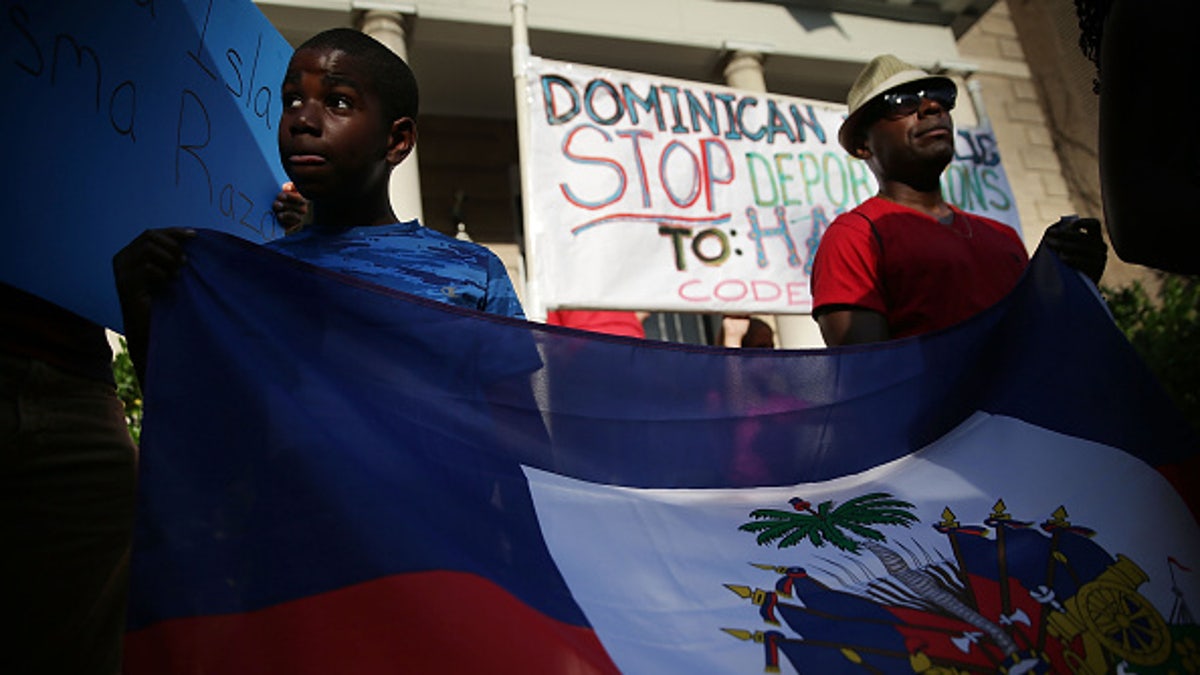
Rally outside the Embassy of the Dominican Republic in Washington, DC, protesting the mass deportations of Haitians. (2015 Getty Images)
Last week, the Dominican Republic halted its plan to expel tens of thousands of Haitian migrants and Dominicans of Haitian descent from the country. According to U.S. News & World Report, pressure from the international community and a wave of negative press led the Dominican government to “pause” their proposed mass deportations. Human rights groups have warned that this is only a temporary respite from a humanitarian crisis.
They are correct, because the situation in the Dominican Republic is far from settled. Press and public attention must continue to be focused on the scapegoating of Haitians by the Dominican government. It is barbaric, inhumane, and deserves condemnation.
The world cannot turn away from human rights violations in the Dominican Republic. There is no legitimate justification for rendering people stateless and subjecting them to mass expulsion.
This controversy reflects the intertwined economies and history of the Dominican Republic and Haiti. For decades, Haitians have migrated to the Dominican Republic to work in the agricultural and service sectors, and their Dominican-born children were always considered Dominican citizens. Then in 2010, the Dominican Republic passed a constitutional amendment limiting citizenship to children of legal immigrants, or those with one Dominican parent. A 2013 court ruling made the law retroactive to 1929, which left thousands of people in a legal limbo.
Last year, the Dominican government passed another law designed to restore citizenship to people whose births were in the national registry, and which promised an opportunity for others to naturalize their status. While in theory that sounds like a solution, the reality is far different. This path to citizenship requires documents that many Haitians in the Dominican Republic simply do not have. Many people born in poor rural areas, for example, lack birth certificates and other proof of identity. Bureaucracy, fees, and a lack of assistance from the Haitian government have also put this proposed fix out of reach for those who need it most.
Meanwhile, the Dominican government set a June deadline for people to register and adjust their status, and has been making plans for forced repatriations. Only the resulting international outcry seems to have put the brakes on their plans – for now.
- Fearing deportation, undocumented Haitians wait in long lines
- Best pix of the week
- Opinion: Dominicans wrongfully characterized as racist, immoral and unlawful
- Haitians, other immigrants scramble for legal residency in Dominican Republic
- Opinion: Immigration overreach is not the answer to a permanent solution
The scale of these mass deportations could be staggering. There are an estimated 450,000 Haitian migrants in the Dominican Republic, and thousands more Dominicans of Haitian descent. Only a small fraction of them have received the residency permits needed to stay in the country.
The Dominican government likes to present this conflict as one involving Haitian migrants. This is misleading. The people affected by the government’s plans are not only Haitian immigrants but also Dominicans of Haitian descent. These are people who may have never been to Haiti. They speak Spanish (French and Creole are spoken in Haiti) yet the Dominican Republic is on the verge of deporting them anyway. Imagine how shocking it would be if the U.S. announced that second- and third-generation American Latinos had to go back to their grandparents’ home countries – within weeks. That is basically what is happening in the Dominican Republic.
Many influential voices have rightfully spoken out against the Dominican government. In June, Pope Francis told a meeting of Catholic bishops in the Dominican Republic that the Church cannot remain indifferent to the plight of Haitian immigrants. New York City Mayor Bill de Blasio called the threat of deportations “racist,” “illegal,” and “defying our common sense of humanity.” Pulitzer Prize-winning author Junot Diaz compared the Dominican government to Nazi Germany and asked, “What happens when a government basically green-lights your most primitive, f---ed up xenophobia?” Julia Alvarez has decried the Dominican court rulings, writing in the Los Angeles Times that they leave “no doubt that the nation has not left its history of abuse and racism behind.” Calls are mounting for a tourism boycott of the Dominican Republic, which would hit the country hard; last year, it was the most-visited destination in the Caribbean.
True, the Dominican Republic is a sovereign nation and has the right to enforce its own laws. But ethnic cleansing – whether it is happening in the Balkans, South Africa, or on Hispaniola – cannot be ignored. Consider that the Dominican government has reportedly set up seven “concentration camps” designed to hold those suspected of being Haitian pending their removal from the country. Or that Haitians in the Dominican Republic are living in such a climate of fear and violence that thousands have already fled the country on their own.
While the global community needs to help Haiti become more stable and self-sufficient, the Dominican government must devise an accessible naturalization process for Dominicans of Haitian descent. And the ongoing harassment of Haitians in the Dominican Republic must be curtailed.
The world cannot turn away from human rights violations in the Dominican Republic. There is no legitimate justification for rendering people stateless and subjecting them to mass expulsion.








































